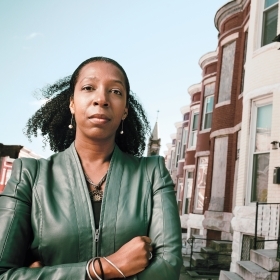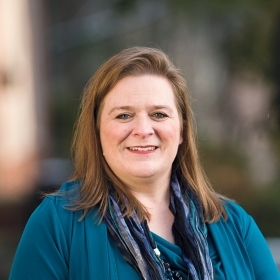“It sounds corny, but there’s so much love built across the walls,” says Colby Lenz ’99. She says this is what has kept her dedicated to social justice work around California’s prison system for over a decade. Colby says she has often witnessed resilience and compassion in an environment that doesn’t support—on paper—any kind of healing, or even love. “People rise to their highest self even in the worst conditions. When a prison is refusing women resources, they are literally circling up in rooms to support each other. It is really [expletive] amazing,” she explains.
Colby is a graduate student at the University of Southern California, where she researches incarceration with a focus on women and trans people in prison. She says that a majority of women in prison are survivors of abuse—sexual violence, especially—and many are locked up either because they have attempted to defend themselves against their abusers, or because they have been coerced into committing illegal acts by their abusers. Colby says, “I think [revoking] laws that criminalize survivors of abuse should be a central human rights issue.”
Colby has been fighting for human rights since childhood. Raised in the suburbs of Toronto, she grew up visiting Canada’s First Nations reserves with her mother, who volunteered there. But it was at Wellesley that she honed her activism skills. She saw the ways racism played out on campus and, wanting things to change, joined a group called Impact. Along with other members, She gained experience in coming up with demands (e.g., hiring more people of color for faculty and staff positions) and having those demands met by the authorities. “It didn’t always pan out the way we wanted, but I learned how to organize,” she says.
Colby is still a fierce advocate for racial justice—many of the prisoners she now works with are women of color. She assists them via two organizations: First, the California Coalition for Women Prisoners, which tends to a variety of the needs of people in California’s women’s prisons. The second organization, called Survived and Punished (S&P), is one that Colby cofounded in 2016. Nationally, S&P chips away at laws that punish people who protect themselves from their abusers, and it also fights for the release of those imprisoned for self-defense.
That work has become more tinged with hope. Colby says that only a few years ago, for example, the likelihood of a person being released early from a life sentence in California’s prison system was extremely low. In the past two years, however, hundreds of clemencies have been granted by California’s governor, partially because of advocacy pathways created by people like Colby.
These pathways depend on simple, consistent acts, and Colby advises those who are interested in getting involved call community organizations that work on behalf of incarcerated people, write letters of support to courts, or attend court hearings. “That can make the difference between someone serving—or not serving—life in prison. Just to be there and witness. When prosecutors know they’re being watched, they sometimes act differently,” Colby says.
Colby mentions Bresha Meadows, a teenager from Ohio who killed her abusive father (and whose 2018 case became high-profile). Colby and her colleagues worked with Bresha’s family and drummed up public support for her, helping transform what could have been a 20-year sentence into a six-month term in a mental health facility.
Victories like that are often bittersweet, Colby notes, because many other incarcerated people continue to suffer. She mentions a frequent occurrence among those she works with. “You’ll have women who say, ‘I didn’t get a chance at clemency, but I’m writing a [letter of support] for someone else.’ And the person writing that letter is still sentenced to die in prison.”







We ask that those who engage in Wellesley magazine's online community act with honesty, integrity, and respect. (Remember the honor code, alums?) We reserve the right to remove comments by impersonators or comments that are not civil and relevant to the subject at hand. By posting here, you are permitting Wellesley magazine to edit and republish your comment in all media. Please remember that all posts are public.